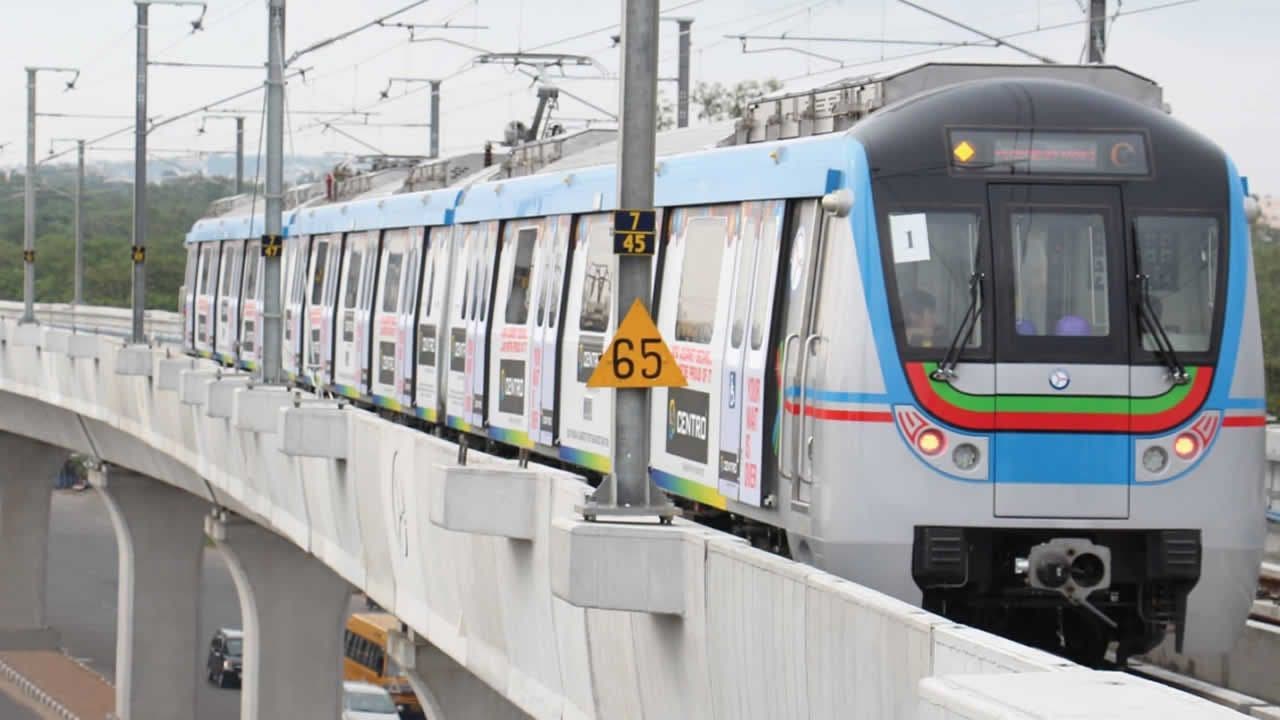
The name of the contractor for the implementation of the Metro Express project has been officially announced on Monday. Indian conglomerate Larsen & Toubro has been awarded the contract estimated at Rs 18.8 billion. The government is firmly determined to realise the project, despite protests from consumer associations and some workers’ unions.
Publicité
This massive project continues to raise controversy, but the government is determined to go ahead, and complete it within the set deadline. On Monday, the main features of the project were presented and the name of the contractor revealed. Larsen & Toubro, an Indian giant in the field of construction and engineering, will realise this project in Mauritius. This company is not new to the country as it has in the past realized projects such as Cybercity Tower 1 at Ebène and the SVICC International Conference Centre at Pailles.
Infrastructure minister Nandcoomar Bodha reiterated that there will be neither delay nor cost overrun, and that the project will cost a maximum of Rs 18.8 billion as estimated. The minister further announced that the fare for a Curepipe to Port Louis trip will be only Rs 37, same as the current bus fare for the same trip. The Metro Express will have a total track of 26 km and the project will be conducted in two phases: The first phase will be from Port Louis to Rose Hill, scheduled to be completed by September 2019 and the second phase from Rose Hill to Curepipe, completed by September 2019. The track will be partly overground and partly elevated.

Jobs
While transport sector workers in the Curepipe-Rose Hill-Port Louis corridor fear of being made redundant if the Metro Express competes with buses, the minister of Public Infrastructure has many times reassured them that there will be no job losses and buses will not compete but will complement the Metro Express, by becoming feeders, ferrying passengers from catchment areas to train stations. He spoke of the creation of at least 5,000 jobs during the construction period, with at least 65 percent going to Mauritian workers. There will be further job creation when the Metro Express starts its operations. Despite these statements, the workers remain unconvinced and demand that the minister provide such guarantees in writing.
Free travel
The current formula of free travel for students, disabled persons and the elderly will also cover travel by these categories of passengers in the Metro Express. The government maintains that the project remains viable even though the free travel scheme is extended to the Metro Express.
Project viability
Economist Georges Chung Tick Kan, in charge of the Metro Express project at the level of the Prime Minister’s Office, predicts a cash flow of Rs 220 million as from the first year itself, and a flow of Rs 12 billion during the 15th year of operation. “This project is the most financially viable projects in our economic history,” he told the audience on Monday during the presentation at Ebène. According to his calculations, if only 20 percent of existing bus users and 10 percent of current car users switch to the Metro Express, this will generate a passenger mass of 53,800 persons which is sufficient to make the project viable. News on Sunday has sought the views of economist Arvind Nilmadhub, who says the hypothesis is realistic, but if we consider other factors, then there might be cause for concern.
“If we add the feeder bus fare to reach the station and the same fare to go back home, then the cost of a complete journey will be a lot higher than the Rs 37, which is the current bus fare providing an almost door to door service. If a private car carries at least two or three persons, then the cost of travelling by car is lower than taking the bus and metro. While I am for the Metro Express, because I believe Mauritius needs a modern efficient mass rapid transit system, we must be careful with some of the components of the project. For example, the implementation team using the hypothesis of 10 percent of car users switching to the metro is clear evidence that the authorities themselves are not convinced that a vast majority of car owners would switch to the metro. We should come up with incentives to encourage people in those areas to leave their car at home and take the metro; otherwise, the problem of road congestion will not be solved. I am also doubtful whether ministers, MPs, top public officials and private sector bosses will leave their car at home and travel by the Metro.
Metro Express in brief
19 stations: Curepipe Interchange, Curepipe North, Floreal, Sadally, Vacoas Interchange, Palmerstone Road, Phoenix, St Jean, Trianon, Quatre Bornes Interchange, Victoria Avenue, Rose Hill Interchange, Reverand Lebrun Station, Beau Bassin Station, Nelson Mandela, Richelieu Depot Land, Black River Road, Victoria Interchange, Immigration Interchange.
About Larsen & Toubro
Larsen & Toubro is a major technology, engineering, construction, manufacturing and financial services conglomerate, with global operations. Headquartered in Mumbai, India, it employs around 80,000 persons.
• In October 2014, Larsen & Toubro bagged the contract for building the 182-metre ‘Statue of Unity,’ the world’s tallest statue of India’s first Home Minister Sardar Vallabhbhai Patel, in Gujarat, for 300 million USD.
• In September 2015, L&T was awarded a $161.3 million contract in Saudi Arabia for the construction of ballastless tracks for Riyadh Metro Lines.
• In June 2016, L & T secured a contract to build a $135 million stadium for Qatar’s 2022 World Cup
• Larsen & Toubro is also working on the Hyderabad 72-km metro project in India. The project has been delayed by court cases following compulsory acquisition of properties by the government.
• The Indian company has also bagged the contract for manufacturing the world’s largest high-vacuum pressure chamber in France, a 3,800-tonne cryostat for the ITER experimental fusion reactor.
In Mauritius, Larsen & Toubro has previously participated in the construction of Cybertower 1 in Ebène and the SVICC International Conference centre in Pailles.
Vikram Jeetah : “From increasing road capacity to increasing transit capacity”
 Vikram Jeetah, a professional in the construction and architectural sector, says that “Government needs to shift urban transportation priorities from increasing road capacity to increasing transit capacity. Mauritius needs a clean and efficient system of multi modal transport: a combination of modes including public transit (buses and rapid transit), bicycles, walking and car-sharing integrated into a connected network, while empowering commuters with choices and information. This will give commuters freedom of choice in true terms, where one can choose alternate modes of transport as well as combine modes on a single trip.” He added that the dream is becoming a reality with the award of the Rs 18.8 billion contract on Monday.
Vikram Jeetah, a professional in the construction and architectural sector, says that “Government needs to shift urban transportation priorities from increasing road capacity to increasing transit capacity. Mauritius needs a clean and efficient system of multi modal transport: a combination of modes including public transit (buses and rapid transit), bicycles, walking and car-sharing integrated into a connected network, while empowering commuters with choices and information. This will give commuters freedom of choice in true terms, where one can choose alternate modes of transport as well as combine modes on a single trip.” He added that the dream is becoming a reality with the award of the Rs 18.8 billion contract on Monday.
Prithviraj Fowdur : “We need to avoid delays and cost overruns”
 Prithviraj Fowdur, economist and former top civil servant, says a major project like the Metro Express should have credible and competent economists in the implementation team. “Such a project should be realized within the set time frame and without any cost overrun. The quality of equipment supplied must be worth the money paid. The team should be proactive and identify issues and think of solutions well in advance, for a smooth operation of the metro Express. It is normal for problems and other teething issues to crop up, but we should be ready to remediate.”
Prithviraj Fowdur, economist and former top civil servant, says a major project like the Metro Express should have credible and competent economists in the implementation team. “Such a project should be realized within the set time frame and without any cost overrun. The quality of equipment supplied must be worth the money paid. The team should be proactive and identify issues and think of solutions well in advance, for a smooth operation of the metro Express. It is normal for problems and other teething issues to crop up, but we should be ready to remediate.”
Protests
Jayen Chellum, general secretary of the ‘Association des Consommateurs de l’île Maurice’ is strongly opposed to the project because he believes this will further deteriorate the country’s debt level. He maintains that we have alternative solutions, such as Bus Rapid System. He has joined other protesters to form an ‘Anti-Metro platform’ in order to voice their disapproval and plans to launch a national petition. Representatives of bus transport sector workers and social workers have joined the platform. Workers are fearing redundancies if buses will not have a major role to play with the advent of the Metro Express, while social workers fear an increase in the number of accidents. The Prime Minister has stated that figures from the United States National Centre for Statistics and Analysis show that accidents caused by Light Rail systems represent 0.0003 % of total road accidents. Pravind Jugnauth also spoke of people being ‘hysterical’ and ‘demagogical’ with regards to the project and recalled that it is a project being discussed since 1987 and was also on the agenda of the previous government.

Notre service WhatsApp. Vous êtes témoins d`un événement d`actualité ou d`une scène insolite? Envoyez-nous vos photos ou vidéos sur le 5 259 82 00 !















![[Document] Réforme électorale : découvrez les propositions du gouvernement](https://defimedia.info/sites/default/files/styles/medium/public/reform_electorale_document.jpg?itok=i-XvATtS)






